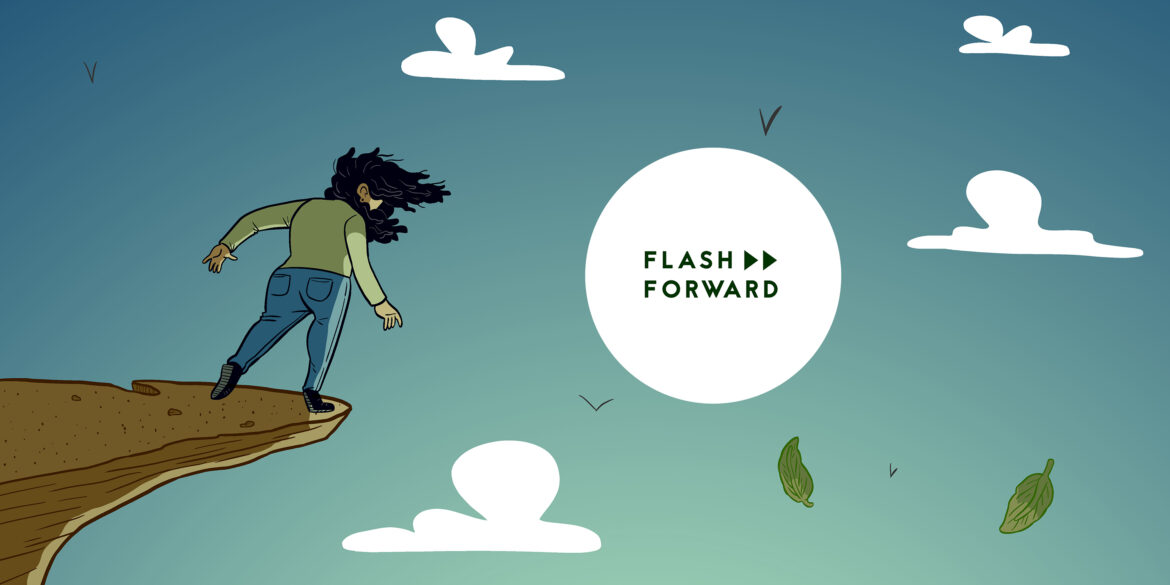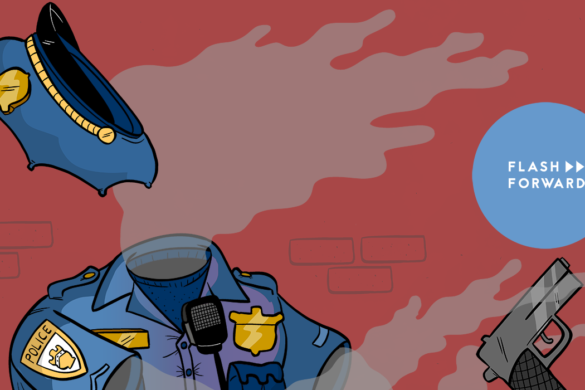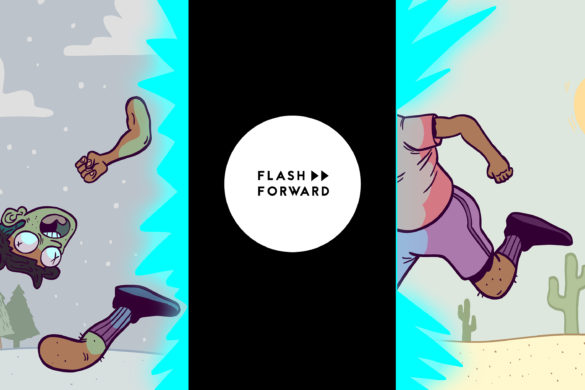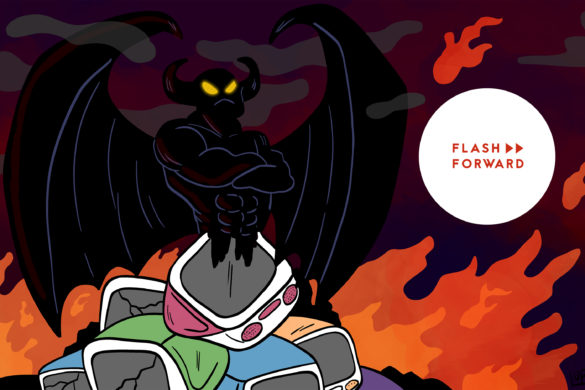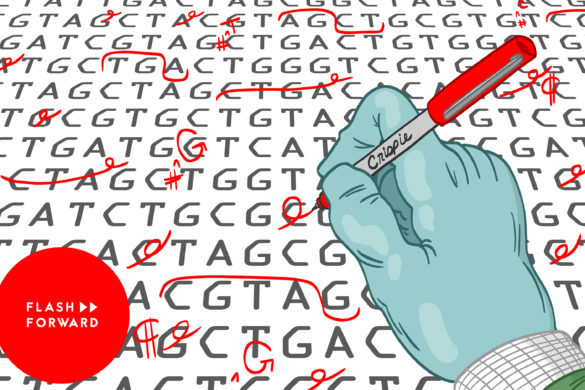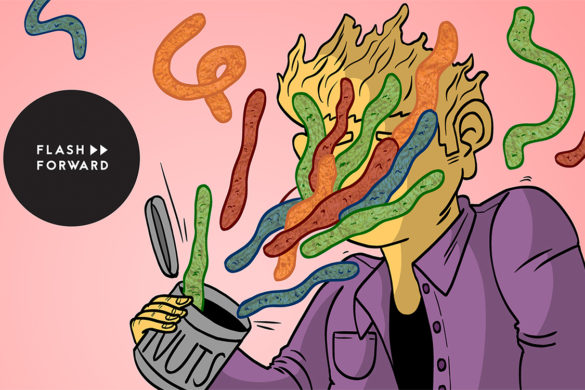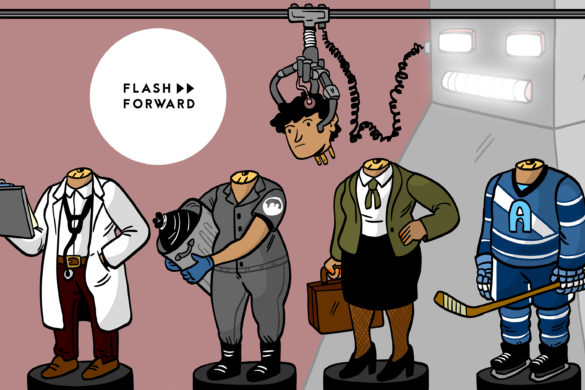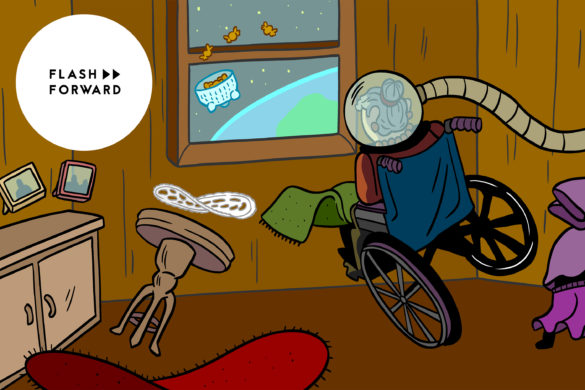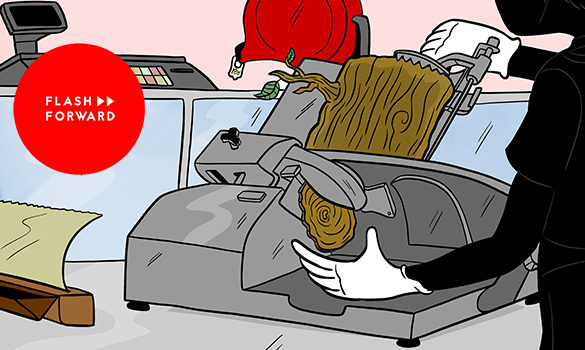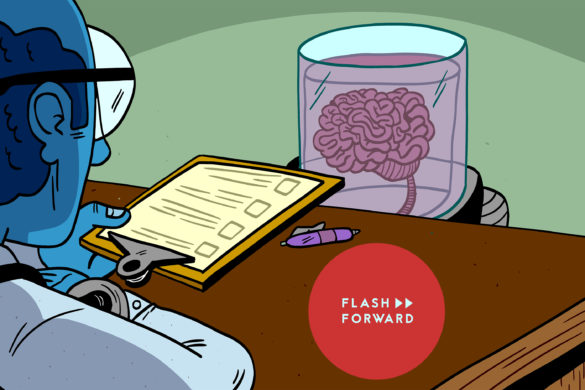Why does it always feel like we’re on the verge of something — great or terrible? And how do we resist the pull, the lull, and the stress of the void?
Guests:
- Dr. Matt Connelly — historian at Columbia and author of the book The Declassification Engine
- Dr. Susan Hough — seismologist at the US Geological Survey
- Liz Neeley — science communicator and founder of Liminal
- Eva Hagberg — architectural historian and the author of When Eero Met His Match.
Further Reading:
- A hundred years hence : the expectations of an optimist
- The Declassification Engine
- Predicting history
- US Office of the Historian
- “Sci-Fi” by Tracy K. Smith
- Earthquake predictions are going viral online — and spreading dangerous conspiracies along the way.
- What is the ‘call of the void’?
- “Storming Toward a Precipice” by Simon J. Ortiz
- “Future Memories” by Mario Melendez translated by Eloisa Amezcua
- PENN & TELLER’S INVISIBLE THREAD
- Earthquake Preparedness: The Importance of Building Codes
Poem Credits:
Tracy K. Smith, “Sci-Fi” from Life on Mars. Copyright © 2011 by Tracy K. Smith. Reprinted by permission of Graywolf Press. www.graywolfpress.org. Audio provided by the Stanford News Service.
“Storming Towards a Precipice” From After and Before the Lightning by Simon Ortiz. © 1994 Simon Ortiz. Reprinted by permission of the University of Arizona Press.
“Future Memories” by Mario Melendez translated by Eloisa Amezcua, Poetry Magazine, 2017, Reprinted by permission of author.
This episode of Flash Forward was written by me, Rose Eveleth, edited by Avery Trufelman, produced by Ozzy Llinas Goodman and sound designed by Ariana Martinez. Much of the music in this episode is by Ilan Blanck. The outro music is by Hussalonia. The episode art is by Mattie Lubchansky. The incredible beat that dropped at the end is by Lazerbeak.
Special thanks to Julia Furlan, who hit the streets of New York City to ask people about aliens for us. Thanks also to everybody who sent in voice memos around that question we couldn’t use them all and wow there were so many good ones. Thanks also to Ed Yong who read a passage from A hundred years hence : the expectations of an optimist; to Tracy K. Smith who read her poem Sci-Fi, and to Stanford University for letting us use that audio; to Jeffrey Nils Gardner who read Storming Toward a Precipice By Simon J. Ortiz; and to Elena Fernández Collins who called to the void for us and read Future Memories by Mario Melendez in both Spanish and English.
FULL TRANSCRIPT BELOW
(Transcript provided by Emily White at The Wordary)
▹▹ ▹▹ ▹▹ ▹▹ ▹▹ ▹▹ ▹▹ ▹▹ ▹▹ ▹▹ ▹▹ ▹▹ ▹▹ ▹▹ ▹▹ ▹▹ ▹▹ ▹▹ ▹▹ ▹▹ ▹▹ ▹▹ ▹▹
FLASH FORWARD
S9E2 – “PRECIPICE”
[clip from1940 film To New Horizons]
[dramatic background music]
Narrator: In a restless search for new opportunities and new ways of living. The mystery and the promise of distant horizons always have called men forward.
ROSE EVELETH:
One of the big things that I say about Flash Forward when I talk about the show, is that I’m really not trying to predict the future. The point isn’t to say that aliens will come to Earth, or that an evil billionaire will put up so many wind turbines that it changes the climate, or that we totally will replace athletes with robots. The point is to try and think about what those futures might entail so we can figure out how to move towards them. Or away from them.
[clip from To New Horizons]
Narrator: New things to do and new ways to do them. Telephones, electric lights, automobiles and aircraft. All are symbols of better living. New places to go. And new means of getting there.
Part of the reason I avoid trying to make predictions is because I don’t like being wrong. It’s easy, and often quite fun, to look at past predictions about the future. Which, I mean, look at past predictions about the future. My personal favorite comes from a book called A Hundred Years Hence : The Expectations of an Optimist, written in 1905, where the authorpredicted all kinds of things, including the end of stairs.
[read by voice actor] “The plan of attaining the upper part of a small house by climbing, on every occasion, a sort of wooden hill, covered with carpet of questionable cleanliness, will of course have been abandoned: it is doubtful whether staircases will be built at all after the next two or three decades.”
It’s also easy, although perhaps less fun, to feel as though we ourselves, right now, are just on the cusp of something — the outbreak of war, a cure for death, truly sentient AI. So many potentials, both inspiring and terrifying, feel like they are right around the corner.
AI ROSE:
Congratulations. You are on the verge of a breakthrough.
[driving electronic music begins in background]
ROSE:
And if you believe the people who get to hold microphones and make speeches, or go on podcasts, or tweet viral Tweets, we are indeed on the cusp of something. What that thing is changes — maybe it’s the apocalypse, or the singularity, or the cure for Alzheimer’s. It doesn’t really matter, exactly, which cliff we’re leaning off of. The important part is that we’re always one step away from whatever is on the other side.
[clips from various speakers]
Trump: America is on the edge of an abyss. And our movement is the only force on earth that can save it. This movement right here.
JFK: And we stand today on the edge of a New Frontier.
Elon Musk: We’re really right on the cusp of what is physically possible.
Biden: Folks, because of you, we’re on the cusp of something huge here.
[music continues with a fast beat, tension building, the fades away]
But are we? Can we actually know if we’re in the moment of change?
DR. MATT CONNELLY:
Historians. We have a whole field. We have, like, journals and conferences. But we seem to have this allergy to analyzing how people think about the future
ROSE:
This is Dr. Matt Connelly, a historian at Columbia University and author of the book The Declassification Engine, which comes out in January. In 2019, Matt published a study called “Predicting History” – about whether historians can really ever know which moments will be significant in the future.
MATT:
If you walk through, say, Central Park, you’re going to see all these statues, and even historians don’t necessarily know who those people are.
ROSE:
So there’s sort of a logic problem here.
MATT:
You know, the things that the people before us thought would be important and enduring, why is it they’re so often wrong?
ROSE:
Amongst historians and philosophers, there is a debate as to the answer to this question.
[optimistic orchestra music begins]
One side says that it is impossible to know which of our current events will be important and interesting to future people. The opposing argument says, no, it’s definitely possible to know which current events future people will care about.
MATT:
Most of us, you know, we’ve had the experience in our own lives, unfortunately, maybe too regularly lately, where things happen in the world and we think, “Wow, that’s a big deal.”
ROSE:
For Americans, moments like the uprising on January 6th, or the planes hitting the twin towers.
MATT:
Moments where, you know, you think to yourself pretty quickly, “I’m going to be telling my kids about this,” and we’re not always wrong.
[tension builds in the music and long notes are held out, then fading out]
ROSE:
But those big events are rare. And of course, for every one of those, there are smaller events that wind up being critically important in hindsight. When van Leeuwenhoek showed people the first microscope, nobody really cared. When Boris Yeltsin picked a guy named Vladimir Putin as his successor in August 1999, most people – even in Russia – didn’t think it would be a globally historic choice. When Alexander Graham Bell pitched his new invention, the telephone, to Western Union in 1876, the company laughed him off and called the device “hardly more than a toy.”
So which side of this argument is right? Can we tell what will matter in the future or not? And how would one even figure that out? One way would be to start polling people now about current events, and then wait like 30 years, and go back and see if those polls were correct.
MATT:
The problem is your experiment would have to be 30 years long. Now, I would love to run that experiment. And if one of your listeners was inspired by Isaac Asimov and he wants to help me create a foundation where we can run 30-year experiments, where we can begin to predict history, not just now but 30 years from now. I’m all for it.
ROSE:
So Matt and his colleagues had to find a proxy. Something that could sort of stand in for this long-term, multiyear dream dataset that they don’t have. And what they settled on was a collection of diplomatic cables sent within the US State Department. These are messages between diplomats and the US government. And when diplomats send these cables, they can flag if they think an event was critically important and perhaps even historic.
MATT:
Things that were classified secret, you know, things that were addressed to the secretary of state. Things that were marked urgent, etc.
ROSE:
So in the moment, diplomats would tag their cables as important or not. But how do you know if they were right? There were, quite literally, millions of these cables. In the dataset that Matt used, looking at cables between 1973 and 1979, there were 1,952,029 that had been declassified and released by the US Government. No matter how many undergraduates Matt had, he and his team could not go through each and every one of those nearly two million messages to figure out what ended up being historically significant. But it turns out, they did have to. Because the State Department had already done that for them.
The US State Department actually has a team of historians whose job it is to assemble an official historical record of the country. And this record includes a sample of cables. In other words, US historians later decided which of these cables were worth saving and putting in the official historical record.
MATT:
What we found is it’s about one in a thousand. That’s how many of these State Department cables, when the historians have a chance to look through them, that’s how many they choose to make part of that official record, the Foreign Relations United States.
ROSE:
So that’s 0.1% of events that are actually considered historically important. It’s super, super rare. Which brings us to the question of whether the diplomats were right. Did they end up flagging the things that ended up being important later? What Matt and his team found is that, in the moment, diplomats were not all that good at knowing what is going to wind up being important later on. And this goes both ways; there were false positives and false negatives.
MATT:
When diplomats decide that something is super important, when they classify it at the highest level, when they send it straight to the top, the secretary of state, what they designate it as urgent, eyes only, and all the rest of it, only about 1 in 100 of those cables end up becoming part of the official record.
ROSE:
For example, one cable classified as SECRET at the time related to negotiations involving Napoleón Duarte before the coup in El Salvador. These negotiations seem to have been really important to the person reporting on them, but in the end, the meetings didn’t really matter that much. The US government’s financial and military support of Duarte made a much bigger difference.
MATT:
So, they’re much more likely to think that something is historic than will turn out to be the case.
ROSE:
On the other hand, there are cables that nobody thought were important, but that actually did mark a historic moment.
MATT:
One related to how the State Department, for the first time, began to revisit their longstanding policy of not allowing anybody who is lesbian or gay or anything else, you know, to be a foreign service officer.
ROSE:
So, what this all means is that … It’s kind of both. Sometimes we can predict what will matter, but not nearly as accurately as we might like to think.
But the thing I really wanted to ask Matt is: why does it matter that historians get the future right? Given these results, knowing that we are not good at this kind of thing at all, is it worth even trying to predict anything ever?
MATT:
I think absolutely. It’s not just human nature. I think, you know, it’s something that even when we’re wrong, we could be wrong for the right reasons. There are people who have been predicting there’s going to be a nuclear terrorist attack in the next ten years, and they’ve been doing that for 30 years. Now, are those people, are they all wrong? Like, do we just dismiss them and think they’re foolish? Those people, at least some of them, were actually pretty influential in getting resources behind trying to scoop up loose nukes, you know, trying to find new jobs for chemists and physicists who otherwise were out of work.
So I actually think that, you know, the best prediction, especially if it’s a worst-case scenario, is the one that is self-falsifying; something where, when you make that prediction and then you issue that warning, things happen and things that make it less likely. So absolutely, I think not only is it human nature, but it’s absolutely vital that we continue trying to make predictions, especially about the worst-case scenarios.
AI ROSE:
You cannot change your history, but you can look at it differently. People are good. It’s just easy to forget.
[clip from YouTube, dramatic reading]
Sci-Fi
By Tracy K. Smith
There will be no edges, but curves.
Clean lines pointing only forward.
History, with its hard spine & dog-eared
Corners, will be replaced with nuance,
Just like the dinosaurs gave way
To mounds and mounds of ice.
Women will still be women, but
The distinction will be empty. Sex,
Having outlived every threat, will gratify
Only the mind, which is where it will exist.
For kicks, we’ll dance for ourselves
Before mirrors studded with golden bulbs.
The oldest among us will recognize that glow—
But the word sun will have been re-assigned
To the Standard Uranium-Neutralizing device
Found in households and nursing homes.
And yes, we’ll live to be much older, thanks
To popular consensus. Weightless, unhinged,
Eons from even our own moon, we’ll drift
In the haze of space, which will be, once
And for all, scrutable and safe.
[quick-rhythmic electronic piano chords play in background]
ROSE:
My mom grew up in California, the land of earthquakes. And when we moved to the East Coast, where hurricanes are the natural disaster you have to worry about, she hated it. She hated watching the storm coming on TV. Hated the anticipation. She preferred earthquakes, she said. They just happen. There’s no waiting, no precipice, just cliff.
DR. SUSAN HOUGH:
It’s possible it’s a fundamentally unpredictable process.
ROSE:
This is Dr. Susan Hough, a seismologist at the US Geological Survey. And I don’t know about you, but our inability to predict earthquakes has always struck me as a little bit odd. I mean, we know why they happen. We know the basic geological processes that create them.
SUSAN:
The litmus test for modern science is, “Do you understand the system well enough that you can predict what’s going to happen?” And so, you know, if you’re studying earthquakes, you should be able to – should – be able to understand the system and predict what’s going to happen. And it seems like, you know, we should be able to do it.
ROSE:
But, we can’t. And it turns out that there are a bunch of reasons why it might never be possible to predict earthquakes. They begin deep, deep underground, in places we don’t have access to. You also can’t easily simulate them in the lab; they require way too much pressure and intensity.
SUSAN:
To understand earthquakes. You have to wait for them to happen.
ROSE:
So really, seismologists are just like us! Sitting around, waiting for earthquakes to happen.
Which is sort of terrifying, given the amount of damage earthquakes can do, right?
SUSAN:
Even as a seismologist, if I’m sound asleep at 2:30 in the morning and it feels like somebody picks up my house and starts shaking it back and forth, my training as a seismologist goes out the window in those early seconds because it is this level of, you know, terror that your world’s coming apart.
ROSE:
If you do a quick search online, you can find all kinds of people making claims about when the next big earthquakes are going to be, based on their own various attempts at modeling everything from actual earthquake data, to lunar cycles, to the movement of Mars.
SUSAN:
It attracts charlatans outright charlatans, and it attracts people who I think are just honestly fooling themselves. They think they found patterns and they don’t really understand the statistics.
ROSE:
And in a lot of ways, earthquake predictions reminded me a lot of future predictions. People are going to keep claiming that they can tell you what is coming. But of course, they can’t. But that won’t mean they will ever stop trying.
SUSAN:
I don’t think we’re ever going to let go of the hope. Just this idea that an earthquake can hit at 2 in the morning out of the blue is not something that, you know, anybody likes to live with.
ROSE:
It’s a fool’s errand, I think, to ask people to stop predicting the future. Even if we know we are mostly wrong. We just love the wager.
LIZ NEELEY:
It’s pleasurable to be right about what’s coming.
ROSE:
Science communicator Liz Neeley says that since it hasn’t happened yet, since it lives in the realm of fiction, we tend to see the future like a novel or a movie. In other words, like a story.
LIZ:
We tend to love narrative closure because our brains are difference engines. We are constantly trying to predict the future.
ROSE:
Human evolutionary history has required us to get good at trying to predict things. That’s how we survived.
LIZ:
Every single one of us is the great, great, great grandchild of humans that were under incredible pressures to take in tons of information, to process it really quickly, to make definitive decisions that have life or death stakes.
ROSE:
So we are, in some ways, wired to try and guess what might happen next. But at the same time, it can feel like that guessing is getting harder. And today, it feels like there are so many things happening all at once. Like we are constantly hurtling towards the edge of something.
[chaotic electronic music swings left and right]
[dramatic reading by voice actor]
Storming Toward a Precipice
By Simon J. Ortiz
A diesel freight truck
roars toward us.
A precipice is no mirage
for its metal plunge.
It is headlong nevertheless.
“It carries its own storm,”
I say dryly, feeling
my tongue wet my lips.
Trapped steel storming,
the faint line just so,
just inches
just split time,
just nothing more
than luck keeps us alive.
The mirage of metal storming
is a precipice, no mirage.
[music smooths to peaceful with ocean waves]
Have you ever stood at the edge of a cliff, or building, or high place, and looked down and had this odd… curiosity about what it would be like to leap? Like… what if I just… jumped?
We’re not talking about true suicidal ideation here. We’re talking about this weird, and terrifying, but also sort of exhilarating pull.
About 50% of people report having this impulse. If you have felt it, you know exactly what I’m talking about. The French call this feeling [French speaker: “L’appel du vide.”] The Call of the Void, and in English it has the much-less poetic name: The high-place phenomenon.
There’s very little research on why this happens. Which means I get to tell you about my own armchair psychology theory. There’s an allure to the edge when you are safely standing next to it. It’s thrilling, in a way, because it offers all of the excitement and potential of big change, of a new beginning, of a leap — but without having to suffer the tumble down the cliff. You’re not actually going to jump. It’s more about the potential. The what if. The precipice.
[music fades away]
EVA HAGBERG:
When you say precipice, I think of just, a sort of… a cantilevered cliff edge over some very, very, very far down space, and somebody just sort of standing on the edge of this cliff edge and looking at the space.
ROSE (on call):
Are you one of those people who has that call of the void thing? Where when you get to the edge of something you have that, like, “What if I just… jumped off this?”
EVA:
Of course. Of course. Yes.
ROSE:
It’s only, like, 50% of people, apparently. According to some of the research.
EVA:
Really? Oh, yeah. No, it’s… I mean, I’m in a sixth-floor apartment right now and the windows don’t have screens. And I didn’t realize that. And so I sort of confidently opened the window, and I realized that I could have just slipped out. And part of me was like, “Ooh, maybe…” You know? So, yeah, I totally have it.
ROSE (mono):
This is Eva Hagberg, an architectural historian and the author of When Eero Met His Match. And Eva knows a lot about standing on the edge of a precipice. Because in 2013 she was told by her doctors that she might die.
[driving, poppy electronic chords play]
EVA:
I had this brain hemorrhage, which we didn’t know is a brain hemorrhage, and then I had this elevated tumor marker. And so I sort of went from being somebody who was diagnosed with anxiety and depression to somebody who was diagnosed with, like… provisionally diagnosed with this very gnarly type of brain tumor.
I mean, I was 31. You know, I’d never thought about my death. I had never thought about anything like that. And I just remember being like, “Okay, this is really serious and I really might die,” and kind of making some sort of peace with that.
[music intensifies to more spooky]
ROSE:
For about five years, Eva lived on this weird edge, suspended there by a medical mystery.
EVA:
I remember feeling very sad because I wanted more life. And I also remember driving around and thinking, “Well, what do I want more of?” And it was just, like, stupid shit. I just wanted more driving around and looking at stuff.
ROSE:
That time living on the edge of life and death was strange. Because, Eva says, it wasn’t all bad. At the time, Eva had a close friend in the same position named Allison, who had metastasized breast cancer.
EVA:
She said… She’s like, “There’s so much freedom where we live, but it’s very expensive.” And I think that is kind of the best encapsulation; I felt this extraordinary freedom. I felt like typical rules of, you know, social life did not apply to me.
[music transitions to thoughtful, ethereal]
That doesn’t mean I was like a jerk or a bank robber. But I did sort of feel like I had this, sort of, fearlessness about interpersonal interactions. I was very available to connect with people. So I felt very free, in a way. And suddenly it was like, “Okay, what if today is the last day that I can read a book fully? Or what if today is the last day that I can, you know, eat a sandwich? What would I do?” And I really… It sort of narrowed my window of experience into, like, very discreet moments of, like, pleasure, and joy, and laughter, and really… just walking down the street in Berkeley. And just looking at a flower and being like, “That flower is so beautiful.” And having a friend text me a joke and being like, “This joke is so funny.” You know, “There’s things that are beautiful and there’s things that are funny and this ice cream is so good.”
ROSE:
But let’s not over romanticize life on the precipice. That’s too easy.
EVA:
And I remember people saying to me like, “I could never do what you’re doing.” And I was like, “I can’t either. I mean, I’m not particularly enlightened. I’m not like, you know, having a great time.”
ROSE:
When you’re constantly on the literal edge, your body and mind get accustomed to a certain level of stress, of intensity, a kind of constant clenching. So that when anything below that high-level, I’m-going-to-die input comes your way, you don’t really know what to do with it. Amidst the brain issues, Eva also had all kinds of allergies and sensitivities.
EVA:
And I remember that was just not… it was not intense enough to be interesting. And so I almost welcomed my surgeries because that would, like, concentrate everything. And I’d be like, “Okay. Intense surgery!”
[soft ethereal music continues]
ROSE:
A lot of us feel like we are at an 11 a lot of the time, when it comes to the future. There is so much to worry about — facial recognition, bomb-toting robots, white supremacy, climate change, the list goes on, and on, and on. And there is a lot to worry about, of course. But we’re also made to feel on the literal edge of all of these things, all the time, on purpose.
Those who want to drive, and shape, and force the future use the emotional power of the precipice to force us to feel that pull, that sense of inevitability. That their predictions, conveniently aligned with their business interests and investments, are inevitable. That unlike those folks in the past, this time we’re going to be right about technology by embracing it, by leaping into that future with both feet. Like there’s no point in resisting. No point in asking questions because really we are just, almost, already nearly there. No time to waste, it’s time to jump whether you like it or not.
[music transitions to energized, more chaotic]
When you first walk up to the edge, it’s alluring. But if you’re forced to stand there, to lean over it constantly, something else happens. There’s an exhaustion, and a numbness. It’s like you’re listening to a song that just keeps building, and building, and building. And you’re waiting for the beat to drop… And it just…. Doesn’t.
[music intensifies, building tension… fades down]
When I spoke with Eva, she was days away from another ledge. The week after we talked, she was going to have a baby.
EVA:
If all goes well, I’m going to know this child for, like, the rest of my life. Pretty big commitment, you know?
ROSE (on call):
Yeah, it’s like one of the biggest ones.
EVA:
Yeah, exactly. I was just thinking, like, this or… Or like dying. I mean, yeah. That’s it. I mean, those are, like, the two most profound commitments; everything else you can get out of.
ROSE (mono):
In theory, Eva knew the outline of what her new life would be like with a baby. But also, she didn’t. Nobody ever does.
[calm, wavy music plays]
EVA:
I find more security and more freedom in this idea that we don’t know what’s going to happen.
ROSE:
Sometimes you do just have to leap off the cliff.
[splash]
AI ROSE:
[chime] Implementing this extent of faith in yourself and others can be very scary at first…
[dramatic reading by voice actor]
Future Memories
By Mario Meléndez
Translated by Eloisa Amezcua
[first read in Spanish, then English]
My sister woke me very early
that morning and told me
“Get up, you have to come see this
the ocean’s filled with stars”
Delighted by the revelation
I dressed quickly and thought
If the ocean’s filled with stars
I must take the first flight
and collect all of the fish from the sky
ROSE:
I spend probably an inordinate amount of time thinking about what might happen if aliens landed on Earth. And if you read a lot of science fiction, as I do, you know that that first contact tends to happen in a few different ways. One of my favorite tropes for first contact, I like to call “the humanity test.”
Male Speaker: You’re about to meet some beings from another planet, boys. Real, live extraterrestrials.
Aliens have discovered humans, and they’ve decided we must be destroyed.
“They say we’re redundant. They say we’re not unique.”
Humans then must convince the aliens that we deserve to be spared.
“They gave 72 hours for us to come up with something that is unique.”
What you just heard is from an hour-long special by the magicians Penn and Teller, which was entirely devoted to this trope. I first encountered the humanity test in the children’s book My Teacher Flunked the Planet, by Bruce Coville. This was also a plot point in an episode of Star Trek: The Next Generation, that humans have to appeal to aliens to justify our existence.
[clip] Speaker: There is evidence to support the court’s contention that humans have been savage. Therefore, I say test us! Test whether this is presently true of humans.
I think this plot is appealing because it forces us all, collectively, to a precipice. The ultimate precipice, really. I mean, complete destruction of our species and planet. There is no bigger cliff than that. What is our excuse for existing? What are we even here for? What could we show aliens about ourselves, about Earth, our planet, that would convince them to spare us? To find out, I asked some people – some random, some listeners – how they might convince aliens to let our planet live.
[clips of various speakers]
[calm, reflective music plays in background]
“Hi, aliens. Welcome.”
“Greeting, friends. I call you friends because today I want to extend friendship.”
“I’m told that you want to kill all humans. And I can understand why.”
“Why? Why do they want to kill us all? Did we… did we do something specific? I mean, I could guess. Certainly we’ve fucked up a lot of things.”
“I think this is what I’d say. I’d say, ‘You know what? You’re right. Humans, we’re not great individuals. We’re selfish, we’re narcissistic, we’re sloppy.’”
“Why are they actually coming here to destroy humanity? Maybe humanity deserves to be destroyed. I don’t know.”
“I would show them how to get a big rock.” “Just to kill us anyway?” “Yes.”
“I’m thinking the alien would probably say, ‘Eh, I’m going to blow it up anyway.’”
“Perhaps, in our encounter with you, we will see a possibility.”
“I don’t know if this would work, but my first instinct is to, like, take them someplace where there’s amazing nature.”
“Volcano. I’d take them to a volcano.”
“If it was a place, one of my favorite places to go is Yosemite, California, which is a beautiful place.”
“Iceland. The earth is, like, black. And there’s all these cliffs. And you can kind of imagine how it came up out of the ground.”
“Oh geez. The Sagrada Familia maybe? I don’t know. I’m trying to think of like, what is the most majestic humanist project?”
“Take them to the Met or something. Like, I’d show them an art museum. But that’s not as cool.”
“Actually, something that comes to mind, just thinking about like here in Brooklyn, when people come and play live music in the park and they just, like, set up shop and everyone’s just vibing with no other, like, agenda, no stage. Everyone’s just like, there chillin’ and enjoying music.”
“Together, we become a magical force when we’re a community. Not a perfect one, sure, but a powerful one. A beautiful one.”
“I do have one thing to say. I don’t quite know if there’s a way to answer this in a way that is, like, together. Because it’s so many pieces. I would need to put so many pieces together to show them. But a lot of the pieces would be, like, standing in front of someone crying, or like belly laughing, or like laying down on the ground, or like a baby. Like, art. Like things that people weep over.”
“Buttholes. (laughs) That’s it. The beginning and end of humanity is right there. Just stare deep into it.”
“That would be a cool adventure to have with aliens.”
We can’t predict how the future will go. Will humans make it? Should we? We know this about as surely as we know whether or not there will be a magnitude 6.2 earthquake on Wednesday at noon. Which is to say, we don’t. Not at all. But in the example of earthquakes, even if we can’t make exact predictions, there are other elements we can know.
SUSAN:
We can make meaningful aftershock forecasts.
ROSE:
That’s our seismologist Dr. Susan Hough again.
SUSAN:
So when an earthquake happens, typically in California, we know there’s about a 1 in 20 chance that something bigger will happen within the next few days. So 1 in 20, that means, you know, 19 times out of 20, nothing will happen. But if you have 20 magnitude fives in California, one of them is going to be followed by something bigger.
ROSE:
So we can prepare. We can stay aware. We can think about the unsexy parts of getting ready for the future. For earthquakes, preparation is about building codes. Nothing is less sexy than building codes. And yet, updating our structures and spaces to be safer is how we don’t die under a pile of rebar and cement. And you can do that whether you know when exactly the earthquake is coming or not.
[energetic music begins to build in the background]
SUSAN:
We all want prediction, right? But the building around us doesn’t give a rat’s behind if the earthquake is predicted or not. It’s going to have to withstand the earthquake, or not.
ROSE:
And it doesn’t take much to see the parallel here to so many other things. We don’t have to know exactly what’s going to happen, and when, to get ready for it. If we can peel our eyes and our hearts away from the sheer terror of the cliff, and focus on the structures that will keep us safe, that will support us in the meantime, that we can improve and act upon right now. I think maybe then, we would all be ready for when the beat really does drop.
AI ROSE:
Kindness is quiet.
[music builds into more frantic and tense]
[finally the beat drops, mixed with Flash Forward closing music- a snapping, synthy piece]
This episode of Flash Forward was written by me, Rose Eveleth; edited by Avery Trufelman; produced by Ozzy Llinas Goodman and sound designed by Ariana Martinez. The song that you are hearing now was created by Lazerbeak.
Special thanks to Julia Furlan, who hit the streets of New York City to ask people about aliens for us. Thanks also to everybody who sent in voice memos around that question. We couldn’t use them all, and there were so many good ones, so thank you so much for sending them. If you are a bonus podcast-getter, you will get a bunch of the extras in the bonus podcast this week.
Thanks also to Ed Yong who read a passage from A Hundred Years Hence: The Expectations of an Optimist; to Tracy K. Smith who read her poem “Sci-Fi,” and to Stanford University for letting us use that audio; to Jeffrey Nils Gardner who read “Storming Toward a Precipice” by Simon J. Ortiz; and to Elena Fernández Collins who called into the void for us and read “Future Memories” by Mario Melendez in both Spanish and English. Also thanks to all of those poets for letting us use their poems.
And a last special shoutout to Eva Hagberg’s new healthy baby, Rosemary, which is a very good name.
You can find a full script of this episode, as always, on FlashForwardPod.com. The episode art is, as always, by Mattie Lubchansky.
This is the second episode in our show’s finale. After this series, which I’ve been calling ONWARD AND UPWARD, Flash Forward will be over. Forever. If you want to learn more about what comes next for me, and to support that work, go to FFWDPresents.com.
[music continues with vocalizations, percussion, and beat, then fades down]
AI ROSE:
Kindness is quiet.
[music resumes to full intensity, a dancy trap beat]
[transitions to “old movie end credits orchestral” and fades away]

